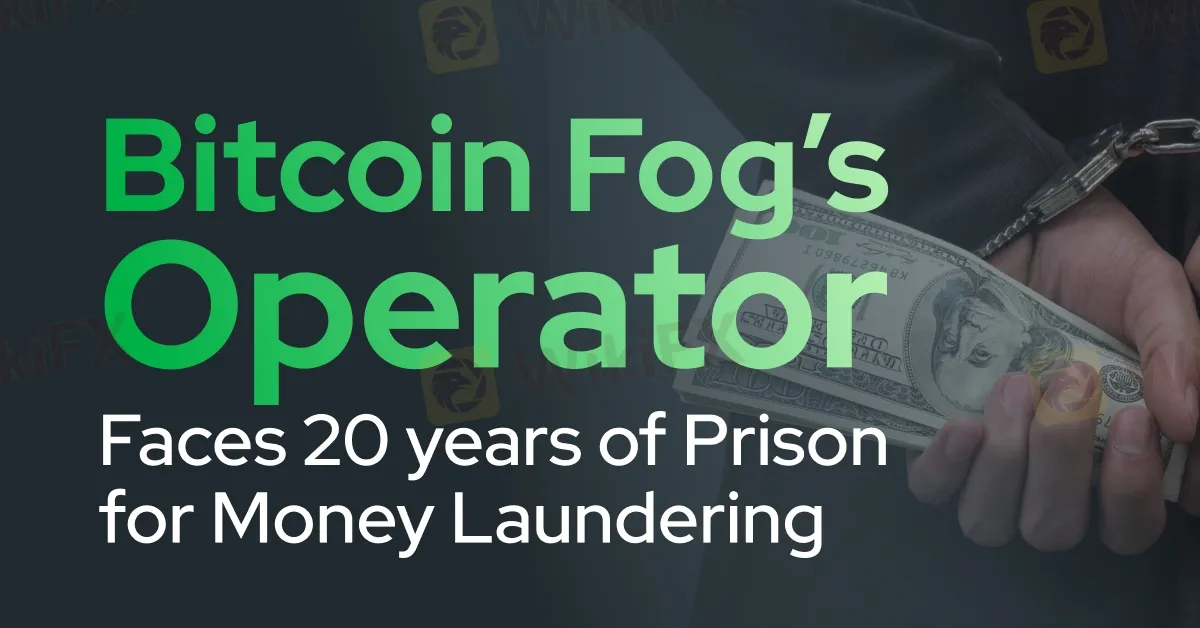简体中文
繁體中文
English
Pусский
日本語
ภาษาไทย
Tiếng Việt
Bahasa Indonesia
Español
हिन्दी
Filippiiniläinen
Français
Deutsch
Português
Türkçe
한국어
العربية
Bitcoin Fog’s Operator Faces 20 years of Prison for Money Laundering
Abstract:Roman Sterlingov, the operator behind the cryptocurrency mixer Bitcoin Fog, has been found guilty of facilitating the laundering of hundreds of millions of dollars, primarily sourced from illicit drug sales on darknet markets.

Roman Sterlingov, the operator behind the cryptocurrency mixer Bitcoin Fog, has been found guilty of facilitating the laundering of significant sums, primarily sourced from illicit drug sales on darknet markets. A federal court jury in Washington convicted Sterlingov on all four counts after two days of deliberation.
Initially indicted in 2021 on charges of money laundering and running an unlawful money transmission service, court documents revealed that Bitcoin Fog processed hundreds of millions of dollars, with $78 million traced back to known darknet markets. Sterlingov, aged 35, now faces a potential maximum prison sentence of up to 20 years.

Testimony during the trial included statements from individuals involved in cryptocurrency-related crimes, such as Ilya Lichtenstein and Larry Harmon, both of whom have admitted guilt to money laundering charges linked to their own crypto activities.
According to prosecutors, Sterlingov ran Bitcoin Fog from October 2011 to April 2021. The service, known as a cryptocurrency “mixer” or “tumbler,” gained notoriety for aiding criminals in laundering funds and concealing illicit proceeds. Over its ten-year existence, Bitcoin Fog processed over 1.2 million bitcoins (BTC), valued at approximately $400 million at the time. The majority of these funds originated from illegal sources, including darknet markets involved in drug sales, computer crimes, and identity theft. Additionally, the service was utilized by individuals distributing child sexual abuse material (CSAM), notably through the site Welcome to Video.
The Department of Justice (DoJ) noted that Sterlingov initially marketed Bitcoin Fog as a tool for anonymizing bitcoin transactions and circumventing law enforcement. The service charged customers a fee for its use. Notably, major users of Bitcoin Fog included darknet markets such as Agora, Silk Road, Silk Road 2.0, Evolution, and AlphaBay. The jury concluded that Sterlingov's activities constituted an illegal money transmitting and money laundering service under federal law.
Throughout the trial, Sterlingov maintained his innocence, claiming he could not recall creating the Bitcoin Fog domain and questioned his involvement in its operation. However, the jury dismissed his defense and the argument presented by his lawyer, citing the lack of direct evidence linking Sterlingov to the operation of Bitcoin Fog.
This case underscores the heightened scrutiny that cryptocurrency mixers have faced from U.S. lawmakers and government agencies in recent years. Mixers have been criticized for complicating the tracing of financial flows due to their ability to obfuscate the origins of cryptocurrencies.
Furthermore, the court ordered the government to seize various assets, including more than 1,354 Bitcoin stored in a Bitcoin Fog wallet, along with $349,625 and other cryptocurrencies (Bitcoin, Ethereum, Monero, Stellar) from Kraken cryptocurrency exchange accounts. Sterlingov's sentencing is scheduled for July 15th.

Disclaimer:
The views in this article only represent the author's personal views, and do not constitute investment advice on this platform. This platform does not guarantee the accuracy, completeness and timeliness of the information in the article, and will not be liable for any loss caused by the use of or reliance on the information in the article.
Read more

Georgia Man Charged in Danbury Kidnapping and Crypto Extortion Plot
Georgia man James Schwab charged in Danbury kidnapping tied to $230M crypto heist. Plot targeted couple for ransom after Miami altercation with son.

Bybit Shuts Down NFT Marketplace Amid Crypto Market Downturn
Bybit announces the closure of its NFT marketplace, citing efforts to streamline offerings. Discover the latest trends in the declining NFT market and its shift to utility-based growth.

Galaxy Digital Settles $200M in Luna Token Manipulation Case
Galaxy Digital pays $200M to settle Luna token manipulation probe by NY regulators, linked to TerraUSD’s 2022 crash, impacting crypto market stability.

April Forex Trends: EUR/USD, GBP/USD, USD/JPY, AUD/USD, USD/CAD Insights
Know April’s forex seasonality trends for EUR/USD, GBP/USD, USD/JPY, AUD/USD, and USD/CAD. Historical insights and key levels to watch in 2025.
WikiFX Broker
Latest News
Exposing the Top 5 Scam Brokers of March 2025: A Closer Look by WikiFX
Gold Prices Climb Again – Have Investors Seized the Opportunity?
Webull Launches SMSF Investment Platform with Zero Fees
Australian Regulator Warns of Money Laundering and Fraud Risks in Crypto ATMs
The Withdrawal Trap: How Scam Brokers Lure Victims into Paying More
FCA to Investors: Think Twice Before Trusting These Brokers
Trump\s tariffs: How could they affect the UK and your money
Trump gambles it all on global tariffs he\s wanted for decades
TradingView Brings Live Market Charts to Telegram Users with New Mini App
HTFX Spreads Joy During Eid Charity Event in Jakarta
Currency Calculator







